Because of a lapse in government funding, the information on this website may not be up to date, transactions submitted via the website may not be processed, and the agency may not be able to respond to inquiries until appropriations are enacted.
The NIH Clinical Center (the research hospital of NIH) is open. For more details about its operating status, please visit cc.nih.gov.
Updates regarding government operating status and resumption of normal operations can be found at OPM.gov.
News & Updates
This August, we focused on pregnancy—providing information, tips, and resources, plus a chance for members of the public to chat with experts over a Twitter #pregnancychat.
Aspirin is generally not recommended during pregnancy, as it can lead to bleeding problems for both mother and baby. But for some women, the benefits of a daily low-dose aspirin after the first trimester may outweigh the risk.
A series of studies by an NICHD researcher suggests that women who maintain a healthy diet and exercise before they become pregnant are less likely to develop gestational diabetes mellitus, a type of diabetes that occurs only in pregnant women.
Ensuring the health and wellbeing of pregnant women and newborns is central to the NICHD mission. Scientists supported by our Pregnancy and Perinatology Branch (PPB) conduct research related to improving care for pregnant women and newborns, preventing preterm labor and birth and other birth complications, and treating diseases in newborns.
Many people are familiar with the health effects of cigarette smoking and secondhand smoke. Research has also tied smoking during pregnancy to later health and behavior problems in children. This podcast round-up features three interviews with NICHD grantees interested in the connections between maternal smoking and child health.
This month the NICHD and the National Institute of Biomedical Imaging and Bioengineering (NIBIB) reissued two funding announcements, inviting grant applications for the development of methods to assess placental development and function. The Institutes intend to commit an estimated total of $2 million to small businesses in 2015 to support this research.
Exercise alone may help prevent gestational diabetes—which occurs in women during pregnancy—from progressing to Type 2 diabetes in the time after pregnancy, according to a study by researchers at the National Institutes of Health and other institutions.
A daily low dose of aspirin does not appear to prevent subsequent pregnancy loss among women with a history of one or two prior pregnancy losses, according to researchers at the National Institutes of Health.
Two surgical treatments for a form of pelvic hernia affecting women have similar rates of success and safety, scientists in a National Institutes of Health research network have found. A guided exercise therapy to strengthen pelvic muscles did not add to the benefits of either surgery.
This February marks the 20th anniversary of the results of Pediatric AIDS Clinical Trials Group Protocol 076—the first study to show that drug therapy could reduce the risk of mother-to-child transmission of HIV/AIDS. The NICHD and the National Institute of Allergy and Infectious Diseases (NIAID) co-funded this study.
Smoking tobacco or marijuana, taking prescription painkillers, or using illegal drugs during pregnancy is associated with double or even triple the risk of stillbirth, according to research funded by the National Institutes of Health.

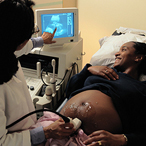

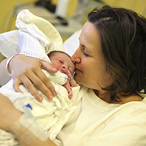
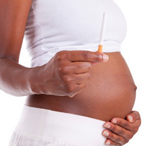
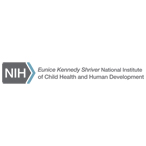
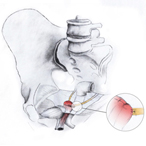

 BACK TO TOP
BACK TO TOP